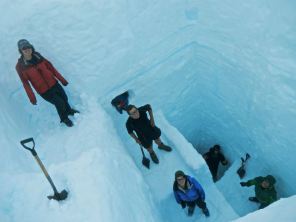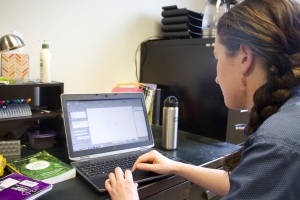Hi all, it’s been a while since we posted anything, with all of the end of the school year business and our founding members now scattered across the globe. However, I assure you that the Science Observer blog is still a thing, and updates are coming soon.
We started this blog as a project for a class at the University of Maine. Now that the class is over, we would like to continue doing what we do- reporting on some of the most interesting and groundbreaking research going on at UMaine’s flagship university.
With that in mind, we have a few things we will be putting up on the blog in the immediate future. First, we will be posting a write-up of our interview with Tyler Carrier, an undergraduate Marine Science Major and invertebrate larvae enthusiast who graduated this past May and hopes to bring his research to new places as a graduate student. Then, we will be posting an update on one of our very own, the Science Observer’s Tadhg Moore, who is currently in Alaska studying the effects of climate change on glaciers.
After these posts are made, the search will begin for our next candidate. With that in mind, if any of our followers know someone at the University who is doing something interesting, let us know!
So far the blog has focused on graduate and undergraduate students, and we hope to continue that, but we are also looking at the possibility of speaking with professors and other research faculty.
Talk to you soon!
glaciers
Podcast – Interview with Annie Boucher
Interview with Annie Boucher, a graduate student at the University of Maine whose focus of study is the glaciers in South-East Alaska. She is researching the interactions between climate, tectonics and erosion on these glaciers.
She discusses her different approaches to understanding this area, what it is about this area that she enjoys and her experience so far out on the glaciers.
Check out the written article here.
Uplifting & Ice-Breaking Research: Annie Boucher Discusses her Glacier Research in Alaska
Last Thursday I met with Annie Boucher, an enthusiastic graduate student who is part of the Earth Sciences program at the University of Maine. Brooklyn-born Annie is still assimilating herself to the harsh Maine environment, but she doesn’t really mind the snow, being well adjusted to even colder places. Glaciers are her focus after all, and it doesn’t get much colder than that. Boucher has had great experience with glaciers, particularly the ones of South-East Alaska. For the past three summers, she has taken part in the Juneau Icefield Research Program (JIRP), an educational program for students at the upper level high school to college graduate level that spends eight weeks traversing the glaciers outside Juneau while conducting research and learning expeditionary skills. All these skills will come in handy for her as this is where her research will be focused.
As a graduate student, the goal of her research is to study the interactions between tectonics, climate and erosion in South-Eastern Alaska. Currently not a lot is known about the tectonics of this area, so she hopes her research will provide the foundation for understanding these factors. What also makes this area even more appealing is that it not only has some of the fastest moving glaciers, but it also has the most active tectonics. This means that there is plenty more to learn about the rates of erosion on particular parts of the bedrock, which if known will make it easier for researchers to create more accurate models as they try to predict what will happen to the region in the future.
This summer Boucher will combine her work with JIRP with gathering data for her graduate research. She is buzzing with excitement to get back on the glacier again and just last week purchased some gear for the trip. She was also excited to be joined by a couple of her good friends, who will be accompanying her on the trip. “Funnily enough two great guys whom I’m great friends with will be joining me this summer in Juneau, and I’m really looking forward to sharing this experience with them,” she told the Observer. What Boucher really enjoys about this area of research is that the interactions between the glaciers and the rock are, at the most basic level, “simple, immediate and intuitive”. The methods she described require a combination of different fields, including the application of engineering concepts to glaciology. While it has certainly proved difficult at times, she feels that it is a challenge she is more than capable of handling. “This is a new process, applying these particular [engineering] methods to glacial erosion,” she said. “So when you start to see results, you feel excited about being at the front of this research.” Although she has been faced with what she calls the “steep icy learning slope” of computer modeling and
programming, she remains confident in her ability and described how people within the department have been more than willing to offer a helping hand when she needed it. She speaks particularly highly of her adviser, Dr. Peter Koons, highlighting how his approach of questioning everything is really pushing her to improve her critical thinking and her approach to various problems. Boucher is a graduate student who shows great enthusiasm for her field of work so I can definitely see her work being key in uncovering some of the mystery that still exists around tectonics and climate. With the glaciers in this area retreating quite rapidly, this is definitely an area where we will see some interesting discoveries, so we will be keeping a close eye on her research project.
-Tadhg Moore.
See the Podcast of the full interview here


